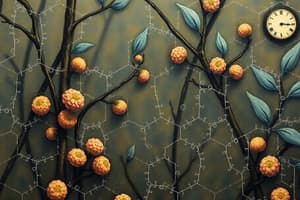Podcast
Questions and Answers
What is the typical ratio of hydrogen to oxygen atoms in carbohydrates?
What is the typical ratio of hydrogen to oxygen atoms in carbohydrates?
- 2:1 (correct)
- 1:1
- 3:1
- 4:1
What is the primary function of carbohydrates in cells?
What is the primary function of carbohydrates in cells?
- Transporting molecules and ions
- Catalyzing chemical reactions
- Serving as an energy source (correct)
- Providing structure and support
Which type of protein is involved in the immune response?
Which type of protein is involved in the immune response?
- Defense proteins (correct)
- Transport proteins
- Structural proteins
- Enzymes
What is the characteristic that distinguishes monosaccharides from disaccharides?
What is the characteristic that distinguishes monosaccharides from disaccharides?
What is the general characteristic of lipids that distinguishes them from carbohydrates and proteins?
What is the general characteristic of lipids that distinguishes them from carbohydrates and proteins?
Which type of carbohydrate is composed of many monosaccharides?
Which type of carbohydrate is composed of many monosaccharides?
What is the function of transport proteins in cells?
What is the function of transport proteins in cells?
What type of lipid is composed of three fatty acids and a glycerol molecule?
What type of lipid is composed of three fatty acids and a glycerol molecule?
Flashcards
Carbohydrates
Carbohydrates
Organic compounds made of carbon, hydrogen, and oxygen, typically with a 2:1 ratio of hydrogen to oxygen.
Monosaccharides
Monosaccharides
Simple sugars that cannot be broken down into simpler sugars, e.g., glucose and fructose.
Disaccharides
Disaccharides
Formed from two monosaccharides, examples include sucrose and lactose.
Polysaccharides
Polysaccharides
Signup and view all the flashcards
Proteins
Proteins
Signup and view all the flashcards
Structural Proteins
Structural Proteins
Signup and view all the flashcards
Lipids
Lipids
Signup and view all the flashcards
Triglycerides
Triglycerides
Signup and view all the flashcards
Study Notes
Carbohydrates
- General Characteristics:
- Composed of carbon, hydrogen, and oxygen atoms
- Typically have a 2:1 ratio of hydrogen to oxygen atoms
- Can be simple or complex
- Types of Carbohydrates:
- Monosaccharides:
- Simple sugars, e.g. glucose, fructose, galactose
- Cannot be broken down into simpler sugars
- Disaccharides:
- Composed of two monosaccharides, e.g. sucrose (glucose + fructose), lactose (glucose + galactose)
- Can be broken down into simpler sugars
- Polysaccharides:
- Composed of many monosaccharides, e.g. starch, cellulose, glycogen
- Can be broken down into simpler sugars
- Monosaccharides:
- Functions:
- Energy source for cells
- Structural components (cellulose in plant cell walls)
- Storage molecules (starch, glycogen)
Proteins
- General Characteristics:
- Composed of amino acids
- Amino acids linked by peptide bonds
- Can be simple or complex
- Types of Proteins:
- Structural Proteins:
- Provide structure and support for cells and tissues
- Examples: collagen, keratin
- Enzymes:
- Catalyze chemical reactions
- Examples: lactase, peptidase
- Transport Proteins:
- Transport molecules and ions across cell membranes
- Examples: hemoglobin, albumin
- Defense Proteins:
- Involved in immune response
- Examples: antibodies, interferons
- Structural Proteins:
- Functions:
- Structural components
- Enzymatic activity
- Transport and storage
- Defense and immune response
Lipids
- General Characteristics:
- Composed of carbon, hydrogen, and oxygen atoms
- Typically have a high energy density
- Can be simple or complex
- Types of Lipids:
- Fatty Acids:
- Simple lipids, e.g. palmitic acid, oleic acid
- Can be saturated or unsaturated
- Triglycerides:
- Composed of three fatty acids and a glycerol molecule
- Examples: fats, oils
- Phospholipids:
- Composed of a glycerol molecule, two fatty acids, and a phosphate group
- Examples: phosphatidylcholine, sphingomyelin
- Sterols:
- Examples: cholesterol, ergosterol
- Fatty Acids:
- Functions:
- Energy storage
- Structural components (cell membranes)
- Hormone regulation (steroids)
- Insulation and protection (fats and oils)
Carbohydrates
- Composed of carbon, hydrogen, and oxygen atoms in a 2:1 ratio of hydrogen to oxygen atoms
- Can be simple (monosaccharides) or complex (disaccharides, polysaccharides)
- Examples of monosaccharides: glucose, fructose, galactose
- Disaccharides: composed of two monosaccharides, e.g. sucrose (glucose + fructose), lactose (glucose + galactose)
- Polysaccharides: composed of many monosaccharides, e.g. starch, cellulose, glycogen
- Functions: energy source for cells, structural components (cellulose in plant cell walls), storage molecules (starch, glycogen)
Proteins
- Composed of amino acids linked by peptide bonds
- Can be simple or complex
- Examples of structural proteins: collagen, keratin
- Enzymes: catalyze chemical reactions, e.g. lactase, peptidase
- Transport proteins: transport molecules and ions across cell membranes, e.g. hemoglobin, albumin
- Defense proteins: involved in immune response, e.g. antibodies, interferons
- Functions: structural components, enzymatic activity, transport and storage, defense and immune response
Lipids
- Composed of carbon, hydrogen, and oxygen atoms with high energy density
- Can be simple (fatty acids) or complex (triglycerides, phospholipids, sterols)
- Examples of fatty acids: palmitic acid, oleic acid (saturated or unsaturated)
- Triglycerides: composed of three fatty acids and a glycerol molecule, e.g. fats, oils
- Phospholipids: composed of a glycerol molecule, two fatty acids, and a phosphate group, e.g. phosphatidylcholine, sphingomyelin
- Sterols: e.g. cholesterol, ergosterol
- Functions: energy storage, structural components (cell membranes), hormone regulation (steroids), insulation and protection (fats and oils)
Studying That Suits You
Use AI to generate personalized quizzes and flashcards to suit your learning preferences.




